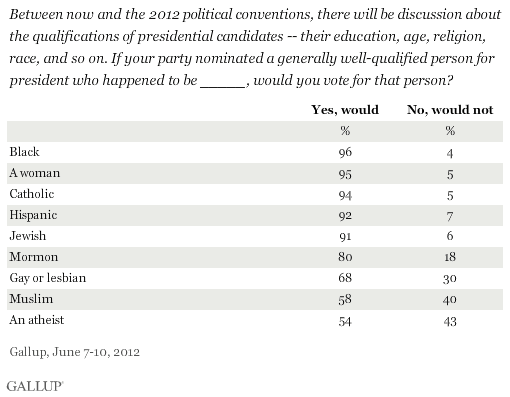
For believers, fear of atheists is fueled by fear of death
https://theconversation.com/for-believers-fear-of-atheists-is-fueled-by-fear-of-death-41724

•
有神未必是真神,无神未必无真神,神是人,人是神。美国人走进教堂未必找得到耶稣,因为耶稣可能跑到中国成了一乡下善良的老太。
-人在异乡为异客-
♂
![]()
![]() (0 bytes)
()
06/20/2015 postreply
12:43:17
(0 bytes)
()
06/20/2015 postreply
12:43:17
•
这个辩证法讲得好
-sunnypacific-
♂
![]() (748 bytes)
()
06/20/2015 postreply
12:53:15
(748 bytes)
()
06/20/2015 postreply
12:53:15
•
agree
-sunnypacific-
♂
![]() (0 bytes)
()
06/20/2015 postreply
13:01:30
(0 bytes)
()
06/20/2015 postreply
13:01:30
•
西方人没有耶稣会很糟糕,因为会更加野蛮;有了耶稣也糟糕,因为耶稣的东西可操作性不强,属于文明道路走错的一类,而且一神排他上了瘾成
-人在异乡为异客-
♂
![]()
![]() (234 bytes)
()
06/20/2015 postreply
13:13:04
(234 bytes)
()
06/20/2015 postreply
13:13:04
•
这个有意思 要想想
-sunnypacific-
♂
![]() (44 bytes)
()
06/20/2015 postreply
13:18:27
(44 bytes)
()
06/20/2015 postreply
13:18:27
•
俗话说,幸福的家庭一个样,不幸的家庭各有各的不幸,错误的方向再多的同向分叉都还是错误的.
-人在异乡为异客-
♂
![]()
![]() (0 bytes)
()
06/20/2015 postreply
14:11:46
(0 bytes)
()
06/20/2015 postreply
14:11:46
•
一次在超市被一韩国美女缠住
-sunnypacific-
♂
![]() (372 bytes)
()
06/20/2015 postreply
12:59:24
(372 bytes)
()
06/20/2015 postreply
12:59:24
•
Beacause so called atheisit is just coded word for anti-Christia
-baiwen-
♂
![]()
![]() (398 bytes)
()
06/20/2015 postreply
12:48:46
(398 bytes)
()
06/20/2015 postreply
12:48:46
•
只要愿意花时间,看看旧约全书,就知道他们的神和神的伦理道德。
-流沙河上-
♂
![]()
![]() (0 bytes)
()
06/20/2015 postreply
17:45:46
(0 bytes)
()
06/20/2015 postreply
17:45:46
•
也不能这么说,圣经里做人的教诲还是很好的
-547788-
♂
![]()
![]() (0 bytes)
()
06/20/2015 postreply
21:44:15
(0 bytes)
()
06/20/2015 postreply
21:44:15
•
新约与旧约很不相同。
-流沙河上-
♂
![]()
![]() (0 bytes)
()
06/21/2015 postreply
06:40:12
(0 bytes)
()
06/21/2015 postreply
06:40:12
 选择“Disable on www.wenxuecity.com”
选择“Disable on www.wenxuecity.com”
 选择“don't run on pages on this domain”
选择“don't run on pages on this domain”

